Review: "Two-Face, Part I" from BATMAN: THE ANIMATED SERIES
This is probably the single most overdue review I've written for this blog.
Of course, this isn't going to be a straightforward review where I discuss the highs and lows of the episode. Want the short review? Here: it's a fantastic episode, but not without its flaws, and I think the second half is a major dip in quality from the first while still ending on a powerful note. In terms of what the show was and what it set out to accomplish, Two-Face is an imperfect masterpiece, but a masterpiece nonetheless. If you haven't seen it yet, it can be watched for free at theWB.com.
But I can't just leave it at that. After all, this is me: your favorite long-winded, nit-picky Harvey Dent obsessive! No, with a Two-Face story and character this beloved, this popular, this definitive, I need to examine (read: nitpick) the hell out of every single aspect of the episode: plot, dialogue, score, design, and most of all, analysis of Harvey's character. I want to find out what makes this version of Harvey tick, what works and what doesn't, and explore the many unexplored areas of his character. Because I care, dammit.

To talk about what made this episode great is, in some ways, to talk about what made B:TAS so great in general. First off, it begins with a perfect example of one of the show's trademark staples: the title card.
Hearkening back to the openings of classic black-and-white movies, the title cards by producer/animator Eric Radomski (among others, but mainly Radomski by all accounts I've found) helped give the show a cinematic flair, and instantly set the stage for each episode. The card for Two-Face is stark and wonderfully minimal in a retro way, although I find it interesting that the shaft of light illuminates the side which will be scarred. Did Rodomski (or whoever) make the common mistake of getting the sides wrong, or did he intend to highlight the part of Harvey which would be lost? Either way, the image packs a punch, especially when combined with that straightforward, no-frills title. If that weren't enough to establish a bluntly inescapable sense of dread, Shirley Walker's chilling theme seals the deal.
The late, great Shirley Walker is another person whose contributions to B:TAS' greatness cannot be understated. She treated what could have been a Saturday morning kids' show with the same effort and skill that she'd give a full-length movie, which really went a long way to making the show seem epic, sweeping, and... well, I hesitate to use the dirty word "adult," but it's certainly the best kind of maturity. Even though she was following Danny Elfman's cues from Burton's Batman movie, her own Batman theme set a different tone for the show. Whereas Elfman's own B:TAS theme was driven, dark, brooding, and thrilling, Walker's was sweeping, hopeful, adventurous, and moving. Not gonna lie, Walker's theme occasionally gets me misty-eyed. And by "occasionally," I mean "right now, as I'm listening to it." While I like Hans Zimmer's music for Nolan's films, those "BOOM! Bum-bum BOOM! Bum-bum BOOM! BAM BAM BOOM!" themes look simplistic and, well, positively one-note compared to what Elfman and especially Walker brought to the table.
My favorite thing about Walker is that she gave each villain their own theme music, a leitmotif that would recur at various points, including when they guest-starred in other episodes. From this episode onward, Harvey would often be accompanied by his mournful sing-song theme (put on some good headphones and really give this a listen):
God, this entire score is just such a feast of excellence, adding more depth to Harvey's character than what we learn in the script or infer from Moll's vocal performance. Harvey's theme is played on recorder, giving it a sense of childhood and playgrounds, but it's contrasted by the ominous strings in the background. It seems to indicate lost innocence, but the fact that it plays for the adult Harvey Dent means that the scars of that childhood linger on.
This is one reason why I personally suspect that TAS Harvey suffered from abuse rather than the "bully" origin we get, which we'll address when it comes up.
At 0:22, the two contrasting themes are joined by a third element: a crackling, tinkling sound that evokes something downright malevolent bubbling under the surface. I associate those sounds with The X-Files, which composer Mark Snow would frequently use whenever the monsters started to show up. It also anticipates the Joker's music from The Dark Knight, which is less of a theme and more a screeching white noise of madness. It's atonal, creeping, and completely incompatible with the simple recorder theme. These two themes could obviously be taken as Harvey's two sides, with the strings being the battleground of his mind. Another way to read it would be that the two themes are BOTH the repressed side of Harvey: an angry child who never grew up, but who remained hidden, festering in the dark corners of Harvey's mind.
At 1:07, the music gives way to a new theme entirely, one that sounds almost ceremonial in its use of strings and horns. This is the music of Harvey Dent, District Attorney, the good-hearted hero, the beacon of hope, full of promise and potential. In tone, it sounds remarkably similar to Harvey's theme from The Dark Knight, but while that one only hinted at upcoming tragedy, Walker's theme is more about that hidden darkness clawing its way to the surface. As such, the D.A. theme can't be sustained for long. At 1:40, the music takes a strange turn, followed by the rumbling of the strings, which pave the way for the recorder's whistling sing-song tune, one last reminder of the nightmare. The tinkling crackles are gone, but a descending string-plucking now echoes behind the flute, like a musical echo or shadow while the strings seem to tremble.
Finally at 2:20, the themes have become integrated, with strings playing variations on the recorder tune throughout the episode. It's a subtly powerful way to show the conflicting sides of Harvey Dent without ever making him simplistically torn between two extremes. But while Walker would explore those elements to greater heights throughout the rest of the soundtrack, I've already spent several paragraphs analyzing just three minutes of music, so let's finally examine the actual episode.
In this retrospective interview with writer/producer Alan Burnett, there was apparently "no resistance whatsoever" from anyone in the making of this uncommonly dark, psychologically-heavy episode. "Our crew and Fox network wanted to push the envelope. I have always loved Two-Face. I think he’s on the very top tier of villains in comic books, even though the number of stories you can tell about him is probably limited. I always thought that it was wrong that the accident that scarred his face created his split personality. He had to have been that way before the scarring. So that was the idea I was working on. I thought it was an original idea for Two-Face, but I found out later that Andy Helfer had written a comic story with that very same notion."
By accident, Burnett came to the same idea, which was the right one. But it wasn't one that was entirely reinforced in the character's previous appearances, regardless of the writers' intentions. From what we've previously seen of the character, Harvey Dent has been depicted as calm, collected, perhaps even a bit clueless, but generally a guy without a care in the world. Even when faced with the prospect of being attacked by the Joker, Dent was determined and unflappable.
Here, the first thing we see is Harvey running, panicked, screaming: he's scared out of his mind, inside his own mind.
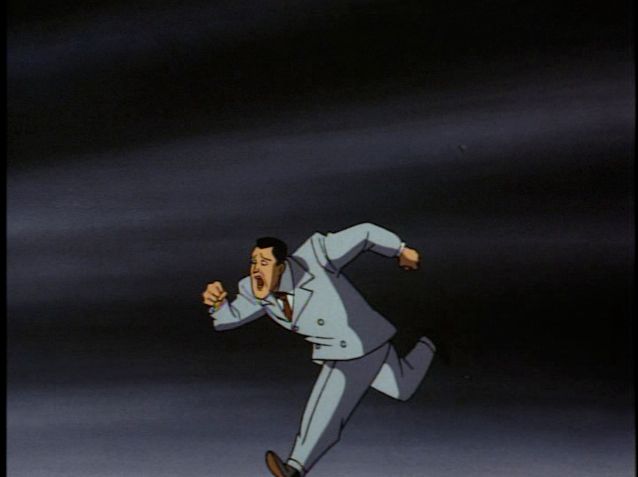
Harvey's nightmare is one of endless mist and darkness, an expansive prison where he can run all he wants but never hide. The dark, snarling voice which will eventually become his as Two-Face is seemingly everywhere, haunting and taunting Harvey. The persona later known as Big Bad Harv (a cutesy nickname I've always detested) responds to Harvey's terror with a sadistic cackle, something that Two-Face would never do. This is the first of several indication that BBH and Two-Face are not quite the same, which I'll come back to later.
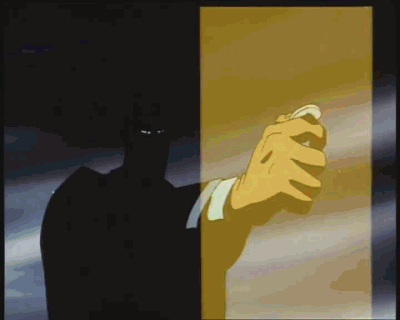
When BBH manifests, it's easy to tell even through shadow that he's Harvey's dark mirror self. I doubt that it was ever meant to be mystery, since there's a never a reveal of "Oh my god, the monster is ME!" I'm grateful that the episode respected the audience's intelligence by not including such an obvious non-twist, which was already made clearer by Harvey's desperate cry of "I want no part of you!"
Amidst Harvey's pleas, BBH begins to flip the coin, illuminated by a shaft of light similar to the title card image. Even though On Leather Wings showed Harvey flipping the coin, it's entirely the symbol of BBH in this episode. What does the coin mean to Harvey? What's the significance of BBH using it to torment his other self? We never find out. At no point in the creation of Harvey's character, not even all the way up to this origin episode, did the B:TAS writers come up with an explanation about the coin. It's just there, first as a visual cue for Harvey in On Leather Wings, now the trademark of BBH. Whatever its significance, it's enough to make Harvey wake up screaming in a cold sweat.
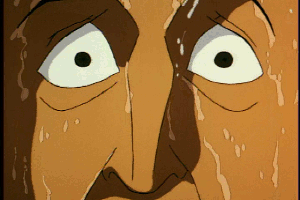
After having apparently taken a power-nap on the couch in his own office, Harvey is awakened by his assistant, who informs Harvey that Gordon called. "The raid's started." Hearing these words, all sense of fear, worry, desperation, and anything else from the nightmare is gone. Harvey instantly sobers, becoming the stoic crime-fighter we've seen in The Batman Adventures comic. This is Harvey in full D.A. mode. Or persona, if you prefer.

We later discover that Harvey spearheaded this raid as part of a campaign promise to bring down mob boss Rupert Thorne. This is the very first instance we've seen of DCAU Harvey being a mob-buster like his comics counterpart, rather than being somehow involved with one of Batman's costumed criminals. Harvey drives out to join the raid already in progress, because he's badass/stupid like that, and is there alongside Jim Gordon to witness Batman taking down the criminals and saving the day. Harvey shows no reaction to the Batman's involvement, which I've always thought was a missed opportunity. What does it mean to this consummate man of the Law that his big plan was largely pulled off only thanks to a vigilante?
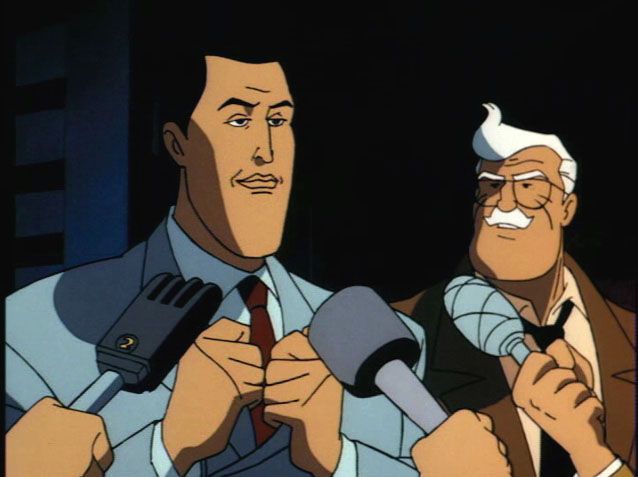
In a moment which echoes Billy Dee Williams' Harvey swearing to bring down boss Carl Grissom in Burton's Batman, Harvey plays to the cameras and authoritatively declares, "As I have stated in my reelection campaign, I will not rest until Gotham City has been 'de-Thorned' once and for all!" Seriously, "de-Thorned" is such a wonderfully cornball politician's promise, and this Harvey has been more depicted as a cornball politician than an actual crime-fighter. In this show, he's had more in common than Mayor Hill than Commissioner Gordon. I guess that makes the contrast even more effective when he snaps after being threatened by one Thorne's more assholish henchmen.
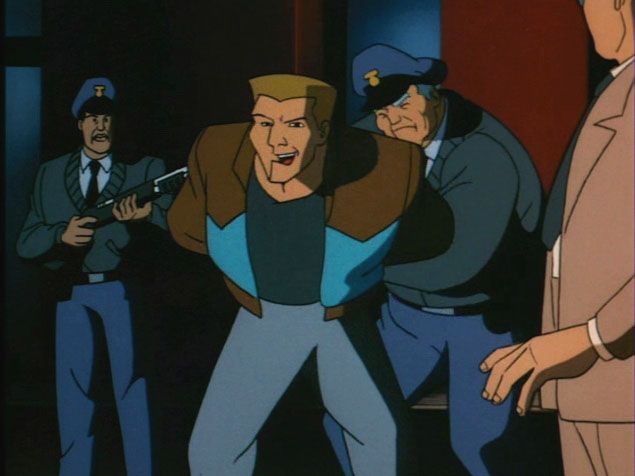
Threatening openly that Thorne will pay Harvey back (and geez, how powerful a mobster is Thorne that his goons can outright threaten reprisals on live TV? I guess Frankie could always play it off as "You won't be so tough when Thorne gets through with you... in court, I mean!"), Frankie the Goon kicks mud on Harvey's suit. Harvey bursts into sweats and teeth-gnashing, seeing (imaginging?) the other goons laughing at him, and he snaps. Letting out an animal snarl, Harvey rips Frankie out of the cops' hands and flings him into the mud puddle, ready to tear him apart.
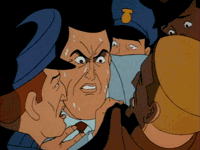
"Kick mud in MY face, willya?!" Well, technically, it was your suit, not your face. But hey, anything that gets the foreshadowing across, I guess. Just as Harvey's ready to pound Frankie's face in, Gordon intervenes, bringing Harvey to his senses. Instantly, Harvey realizes what he did and what he was about to, as well as the fact that the press is still there, recording his every move. Awkward!
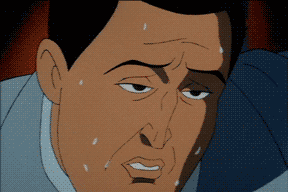
When Gordon asks, "What in the name of heaven did you think you were doing?" Harvey sheepishly replies, "I... I dunno. I guess he just pressed the right button." "That's one heck of a button." While we later learn that Harvey is well aware about his other personality, his reactions here seem to indicate a genuine confusion, if only out of a sense of denial to himself. Maybe the "I guess he just pressed the right button" is a lame excuse to downplay the outburst not just to Gordon, but also to himself.
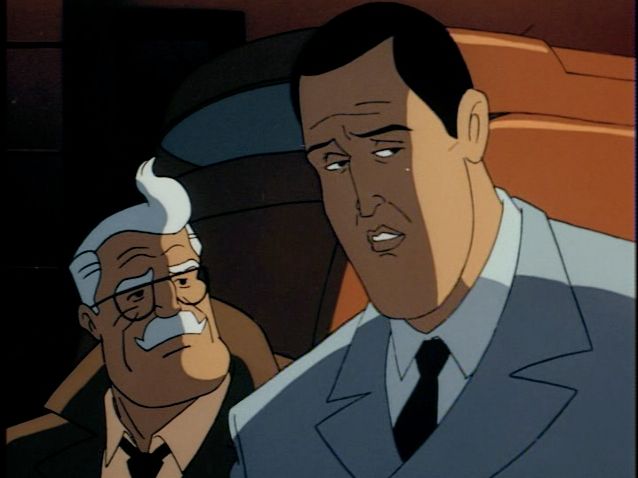
The scene cuts to Rupert Thorne plotting and planning, (where he delivers one of the best lines of the episode: "All men have something to hide. The brighter the picture, the darker the negative.") but for now, let's skip ahead to just focus on Harvey. We'll take a closer look at Thorne in general in the next post. We next see a far more composed Harvey at Wayne Manor, where Bruce has thrown a fundraiser in his best friend's honor, complete with an ice sculpture of Lady Justice.
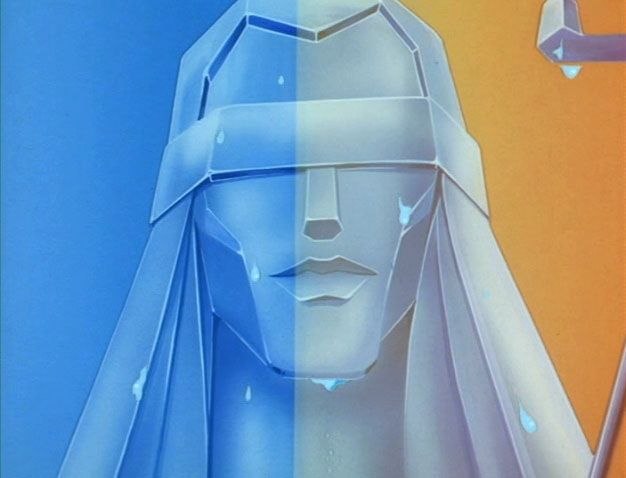
The opening image of the Lady Justice statue in close-up is a great example of all the detail crammed into this show that you might not notice without a pause button. If this were a comic, the symbolism of Justice "sweating" while her face is bisected from the poster behind her would be immediate and unmistakable. Here, you blink and you'll miss it. Frankly, I like that the show doesn't dwell on the symbolism. In comics, symbolism is too often used in place of story. Here, the plot moves ahead at a brisk-but-tight pace, while stuff like symbolism and metaphor are easter eggs, thematic details that add to the story if you catch 'em.
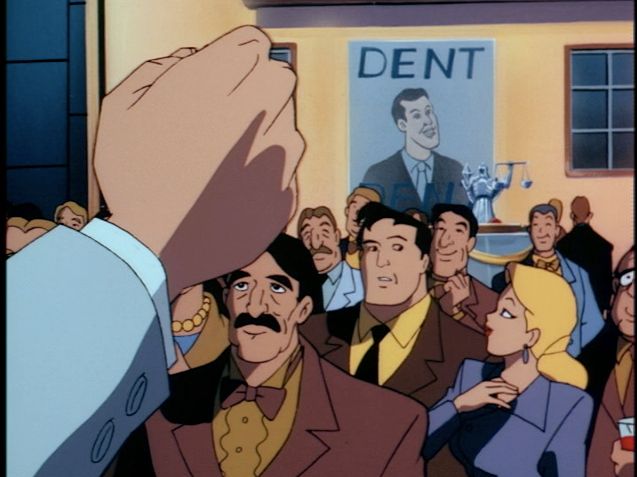
It's here that we're introduced to Grace Lamont, our Gilda Dent stand-in for the DCAU. Presumably, she's named so after the one comic which inexplicably changed her name to Grace, which is still the greatest take on the character to date. Unfortunately, Grace Lamont is very much in keeping with classic Gilda in that she's a complete non-character who exists only for Harvey. Heck, even Golden Age Gilda was a sculptor, which at least hinted at her having a life of her own! Here, Grace has nothing of the sort. She pops up with no explanation, no backstory, and no real personality. She's terribly bland, and like classic Gilda, she serves no purpose other than to be Harvey's moral compass. Also, even though we've never met her before, she's already Harvey's fiancee. This wouldn't be so bad if Harvey wasn't already engaged to Pamela Isley, like, last WEEK. Like I said there, it's evidence that he's a romantic idiot.
Showing their support for Harvey, Grace and Bruce talk during his speech about their concerns that Harvey seems different. Bruce's comment,"Though lately he seems awfully... intense. Is he all right, Grace?" indicates that this is the first time in their five-plus years of friendship that the great detective noticed anything was amiss with his friend. This suggests that Harvey was in control of BBH until recently, unless he was just so good at covering it up that even the world's greatest detective didn't notice.
My immediate question was what causes BBH to resurface? What triggered Harvey's suppressed anger and kicked off the nightmares? Was it the stress of going after Rupert Thorne? That would make the most sense to me, since it's classic Harvey Dent to be terminally frustrated from dealing with an untouchable mob kingpin who manipulates the system to his own ends. But no, the only explanation we get isn't mob-related at all.
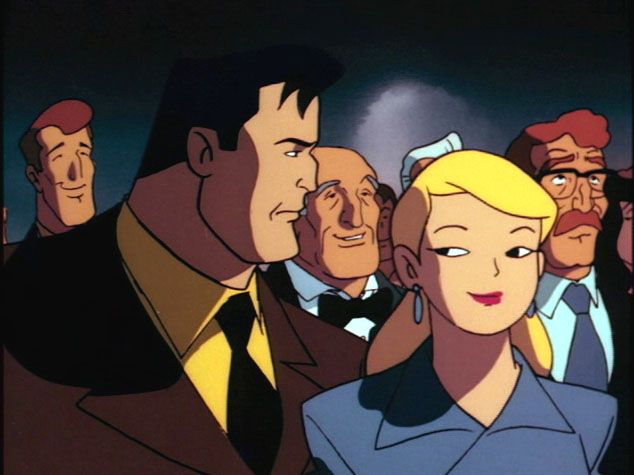
Kurt Vonnegut? What the hell are YOU doing there?!
According to Grace, Harvey is just under a lot of strain from the stress of campaigning. Now, this could just be Grace making an assumption and misunderstanding what's really going on, but if it really is the campaign stress that's bringing BBH out, then this again plays to the idea that DCAU Harvey is a politician first and foremost. Either way, I have to wonder how effective he is as a D.A., or even just as a lawyer in general! We never see him in the courtroom, nor do we ever hear about his conviction rate. For all we know, he's just a pretty face with a good heart and not much else. The most we see of Harvey in action is as he's schmoozing with constituents and engaging in cringe-worthy "banter" with Grace and Bruce before a chuckling crowd.
But the cloying pleasantries serve a narrative purpose once they're undercut with bad news, delivered by Harvey's assistant, Carlos: the judge threw out the case against Thorne's men from the raid because "the warrant was incomplete." It's the classic legal trope of a lousy technicality allowing the release of clearly-guilty villains. Even putting aside his simmering anger issues, Harvey's reaction is rather understandable.
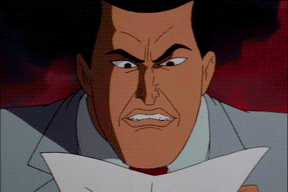
"I spent three months on that raid! The fool! He's been bought... just like all the rest!" That's more the Harvey I know, the one strained by the rampant corruption in the system. In his rage, he not only attacks Carlos, causing the statue of Justice to shatter. More symbolism! Bruce tries to bring Harvey back to earth, but he's not as effective as Gordon. Harvey snarls at his friend, calling him a "rich twit," and it's only Grace who gets through to Harvey by interposing herself between Bruce and Harvey's fists.
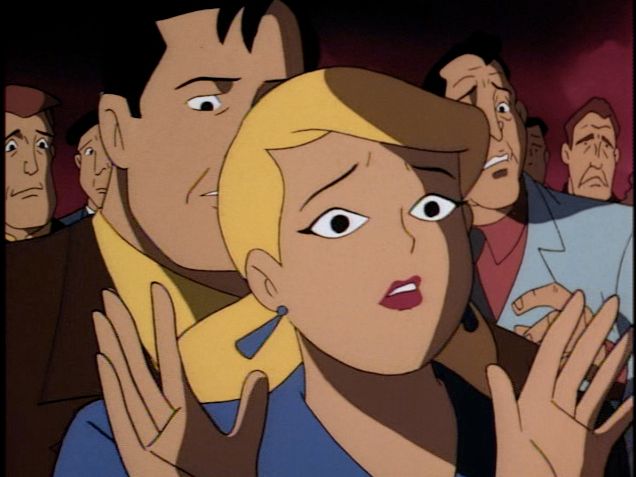
I find it interesting that the police commissioner and Harvey's out-of-nowhere fiancee can bring him back to earth, but not Bruce, his best friend of many years. Between that and the "rich twit" like, I have to wonder if some part of Harvey doesn't feel resentment towards Bruce's privileged background, perhaps driven by buying into the "spoiled playboy" façade.
Thanks to Grace's intervention, Harvey instantly sobers, but is once again humiliated for having blown up in front of a large crowd. Meanwhile, the whole outburst has been personally witnessed by Thorne's henchwoman, Candice, who sees potential for blackmail here.
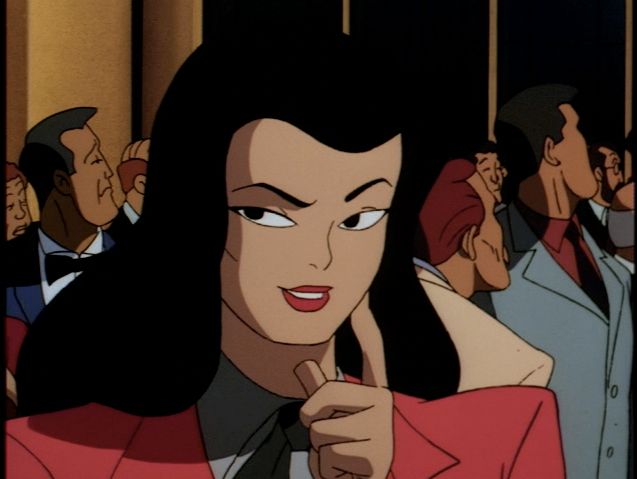
Hmm, I'm scheming. This is my scheming face. First, I raise one eyebrow, and then...
I like Candice as a villain, and I wish that she appeared in more episodes than this and Bane, where her future afterward looked less-than-rosy. Here, she's a great femme fatale, except that she never resorts to the femme fatale's main weapon of manipulation through her sexuality. In fact, a she's smart and capable villain in her own right. While she enjoys the company of evil men like Thorne, she's not just arm candy, but is in fact the main driving factor behind Thorne's plot against Harvey. Thorne knows what he generally wants, but it's Candice who does all the legwork.
What's more, she's animated with a more-than-passing resemblance to Grace. Granted, this could be because all of the TAS women look essentially the same, but in this case, I'm certain that the resemblance is intentional to make them the good and evil women in Harvey's life (because, of course, blond hair equals good, black hair equals evil), each pulling him towards either end. Why didn't Candice ever come back to become Two-Face's moll, his mirror Grace? I mean, y'know, aside from the fact that she's about to totally ruin Harvey's life, manipulate Grace, and sour their own relationship? Feh, details! Two-Face deserves his own henchgirl! Why should Joker, Mr. Freeze, Penguin, and Calendar Girl have all the sexy help?
In private, Grace lets it slip to Bruce that Harvey's been seeing a therapist. Once again, that's another example of ways that Bruce and Harvey know so little about one another. Harvey keeps his own secrets, just as Bruce does. Why are they even friends? It has to be for more than just the mutual benefit of maintaining their mutual façades, even if Harvey's is more genuine than Bruce's.
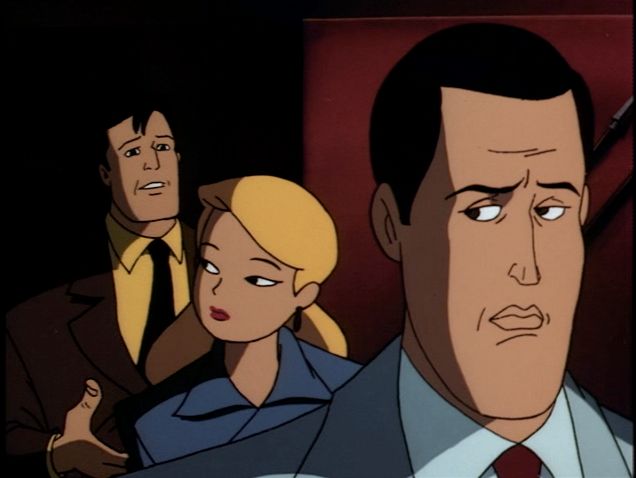
Harvey's main reason for being secretive is fears of how it will affect his campaign. "You know how some voters feel about... shrinks." While I like how this touches upon the stigma on mental illness (a stigma which, sadly, the Batman villains tend to reinforce), its use in this story speaks to Harvey's own fears of how he'll be perceived, not to mention how it will affect his career. It's a variation on the classic meme of Harvey being vain, only with far more at stake than just his pretty-boy looks. I like it, but I wish that his ideals would be in the mix as well, considering where his story is going. As we'll later see, Two-Face defines his life by ideals, but Harvey Dent does not. That doesn't work.
For Harvey, the struggle is entirely based in keeping his darker impulses in check. So okay, let's examine the DCAU's take on Harvey's darker side. But before we continue with the episode itself, I'd like to bring in supplemental material for your consideration: the YA novelization Batman: Dual to the Death, which adapted both parts of Two-Face, plus both parts of the Batgirl origin episode, Shadow of the Bat.
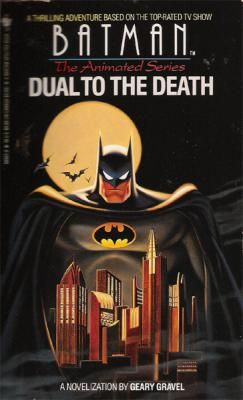
Since novelizations often work from earlier versions of their scripts, you can usually spot some details here or there that weren't included in the final produced story. In this, there's a second dream sequence that confirms--SPOILER!--that the "other self" is actually Harvey himself! Whattatwist! I have no idea whether that scene was in the original script, or if writer Geary Gravel added it for extra obviousness. But some of Gravel's other contributions add a new dimension to scenes as they aired in the episode.
Which brings us to the scene at Harvey's psychiatrist, Dr. Crest, who puts Harvey under hypnosis in order to speak to his dark side, which is now revealed to be named "Big Bad Harv." The silliness of that name is undercut by the genuine creepiness of this scene. There's no music, no soundtrack other than the rainstorm outside, punctuated by thunder and lightning. Is it a horror-movie cliche? Certainly. But B:TAS has always thrived by drawing from the classic monster movies, and this scene feels like one wrapped inside a psychological thriller.

In another perfect moment of blink-and-you'll-miss-it symbolism, the lighting gives a glimpse of the monster within. It should be cheesy, but it's handled so quickly, so fleetingly, that it works. If this were a comic, or if they lingered on that shot for even a frame longer, it would have been silly. Hell, even seeing it on loop in this gif lessens the impact of that shot in context:

Sorry for the epileptic shock, folks!
Alan Burnett credited this moment with episode director Kevin Alterti. "We didn’t want to reveal Harvey’s scarred face until the end of the show, which presented the challenge of holding our audience’s attention with a villain who had no costume or special accoutrements. He was just a Suit, albeit a crazy one. Fortunately he was well acted in the animation. Also, the director, Kevin Alteiri, bless his heart, figured out a way to foreshadow the scarred face with lighting effects in a scene in a psychiatrist’s office."
With Big Bad Harv rising to the surface, Harvey's demeanor hardens and turns cold. Reaching into his pocket, he produces the coin, which he then proceeds to flip menacingly. Again, what's the deal with the coin? Why is it tied directly to Big Bad Harv?

At this point, I should mention that this show is the second time that anyone's written Harvey has having a secondary personality. Sure, it was suggested (but ultimately disproven) in A Lonely Place of Dying, and Eye of the Beholder did it first, but as we've established, episode writer Alan Burnett had never read EotB, and was coming to this idea on his own. While the idea that Harvey's other personality is a cruel bully is something we've seen in stuff like DeMatteis' Crime and Punishment and Rucka's No Man's Land, the DCAU is the first to properly do it.
Which raises the question: what the hell IS Big Bad Harv? In the show, we learn that he's the result of Harvey's guilt and shame at having once lost his temper in a fight with a bully. Harvey mistakenly thought that he put the kid in the hospital, and became so ashamed that he suppressed his anger for years, which festered and manifested (manifestered?) as Big Bad Harv. It's hardly the stuff of compelling tragedy when compared to, say, systematic childhood abuse at his father's hand. But then, as we've already established, writer Alan Burnett hadn't read Eye of the Beholder--the story which established Harvey's abusive father--when he wrote this episode.
In that same interview, Burnett explained the genesis of the bully origin: "I consulted with a child psychiatrist to come up with a kid-understandable reason why Harvey Dent developed a split personality, and was surprised to find out that it doesn’t take much to start that sickness going." I think the "kid-understandable" line is key, here, since the average child would certainly understand bullying far more than abuse. But as a child of abuse myself, I can attest that it would have been incredibly meaningful and powerful to see it represented in a show like B:TAS. I suppose that wouldn't have flown with the Fox Kids censors of the time, but at least it would eventually be worked into the DCAU comics years down the line (a story which we'll examine in due time). For now, we're stuck with the bully origin.
That said, Dual to the Death adds an interesting detail when Dr. Crest equates Big Bad Harv to being nothing more than a big angry child, something which could also apply to the Two-Face of comics such as Crime and Punishment. When combined with the language and attitudes BBH uses towards Harvey ("The guy's a wimp"), it's easy to conclude that BBH has now, in effect, become Harvey's biggest bully of them all.
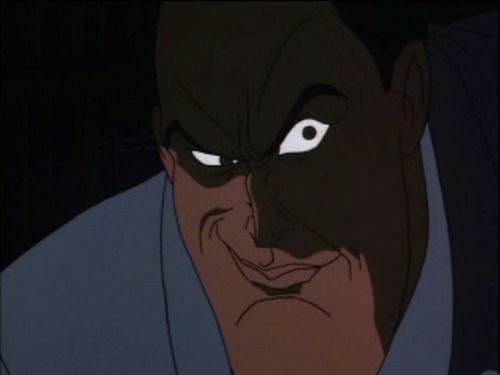
While one would naturally assume that BBH is the Two-Face personality that will take over once his body is scarred, it's worth noting that BBH shares almost nothing in common with Two-Face as we know the character, save for the voice. BBH is Harvey's Mister Hyde: a cruel, vicious, sneering, smiling, ravenously animalistic monster who revels in evil. I defy you to look at the above shot and tell me that it in any way resembles Two-Face's demeanor of the DCAU.
After BBH smashes the window and is about to attack Crest. In what Alan Burnett describes as his "Hitchcock moment," she snaps her fingers and wakes Harvey up out of hypnosis. He's horrified at what he's done, and anguished as to what he can do to get better. Crest suggests that he check himself into the psychiatric ward at the hospital, but campaign-mindful Harvey blanches at the notion. Could Harvey's tragic fate have been avoided if he had put his sanity before his career? Probably not, since either way, the fact that Candice was listening in just outside the office meant that Thorne was going to make his move either way.
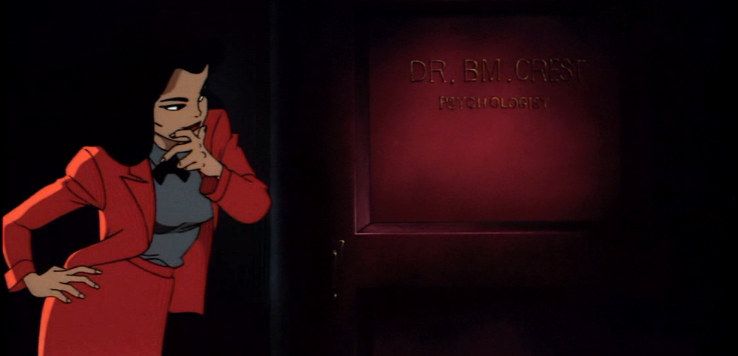
Still scheming!
Harvey's last moment of happiness comes, appropriately enough, on the cusp of his greatest triumphs. First off, he wins the election against his unnamed opponent (Dual to the Death has it be Janet Van Dorn, the Gotham D.A. who appears in Shadow of the Bat and, most notably, Trial), followed by telling Grace that he plans to announce their wedding date as part of his acceptance speech. Because again, romantic idiot.
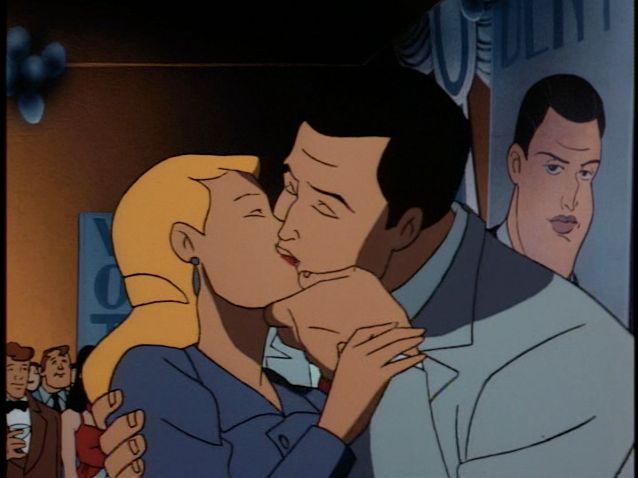
Everything sours once he gets the call from Rupert Thorne, who has obtained Harvey's psychiatric file and wants to talk deal. When Harvey throws on his dark gray fedora and coat (both of which he'll still be wearing as Two-Face), Bruce and Grace both notice that something's deeply wrong, but he refuses their help. Why? Does he not want to risk either of them getting hurt at Thorne's hands? Sadly, I suspect it's far more likely that he's too prideful and too insecure to risk even letting his best friend and fiancee help. This gives Harvey a Shakespeare-level tragedy where his personal flaws hasten his own undoing.

As Batman, Bruce follows Harvey to a mysterious refinery, where he meets up with Rupert Thorne and assorted henchmen. Thorne reads Harvey's file aloud, going into the origin of BBH, and offers Harvey to keep it a secret as long as Harvey plays ball. Otherwise, the people of Gotham will soon know the man, "or men," they've elected. As Thorne gloats and the henchmen laugh, Harvey starts pouring sweat, reaching his breaking point.

But instead of exploding like before, the boiling fury suddenly seems to dissipate. The sweat dries up, and Harvey seems overcome with an unsettling, dead-eyed calmness...
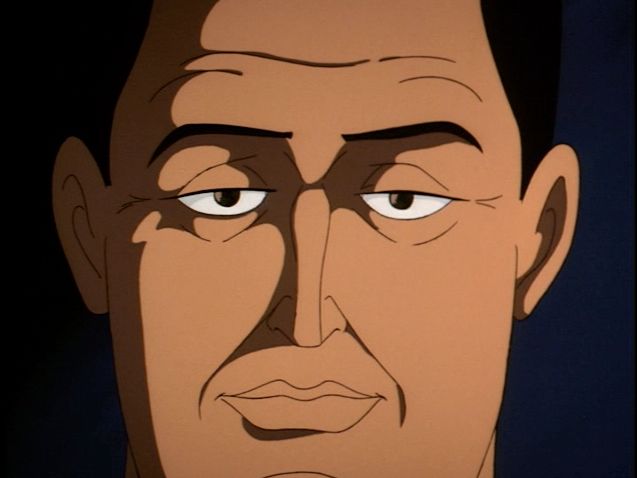
... which soon turns downright sinister. Hyde is in control.
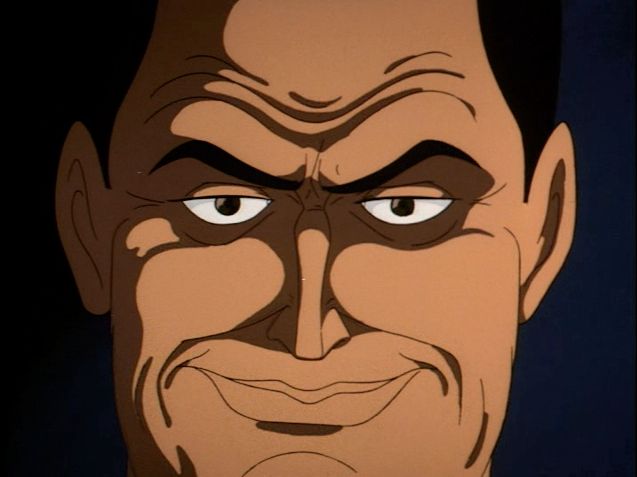
"There's just one problem."
"Oh yeah? What's that?"
"You're talkin' to the wrong Harvey."
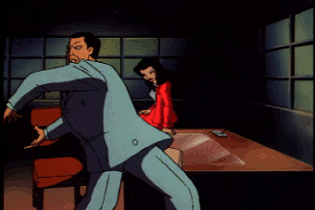
BBH proceeds to go shithouse on Thorne's men, tearing into them with a viciousness that, again, we'd never see from Two-Face. He's hunched, feral, snarling, and ready to rip everyone apart with his bare hands.

I don't know if it's intentional, but the animation here seems to overlap, as if BBH leaves shadow outlines of Harvey's own body movements.
Whatever's about to happen with Harvey, it's clear that he won't become this monster entirely. I doubt that BBH would have made any kind of criminal mastermind, since he's too wild and out of control, but his body count may well have been higher than Two-Face's if given the chance. BBH is an inhuman force of pure malicious hatred, and Thorne would have been a dead man if Batman hadn't intervened.
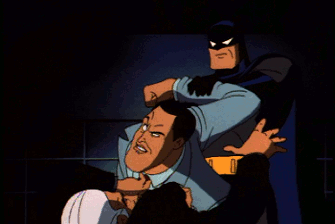
Batman and Harvey proceed to battle the henchmen while Candice watches with amusement from the sidelines. Thorne makes a break for it along the catwalk between the exposed tubs of nondescript boiling chemicals, and the resemblance between this setting and Axis Chemicals from Burton's Batman is giving this entire scene a fatalistic sense of deja vu. Harvey races after Thorne on the catwalk, just as Frankie takes aim with his machine gun.
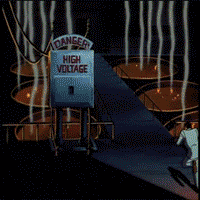
Y'know, while I always used to think that this was a less graphically horrifying scarring than having his face melted off by acid, I'm forced to reconsider that belief as I watch just the explosion part play over and over and over again in gif form.
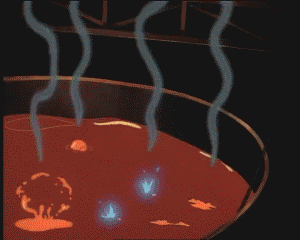
Yikes. That actually looks way worse than being burned by acid or catching fire. Realistically, I can't help but wonder what kind of internal damage he must have suffered from the way he went flying.
Batman races over to Harvey's smoldering body and turns him over. It's Batman's reaction to what we don't see which really sells the moment, as it's one of the only times we ever see the Dark Knight look both horrified and downright anguished.
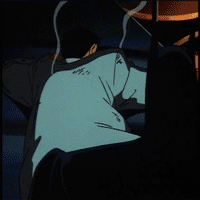
Harvey ends up in the hospital, bandaged and unconscious, with Grace and Bruce by his bedside. At the very least, the press seems certain that his D.A. days are over, but only Thorne and Batman are concerned about what Harvey may become.
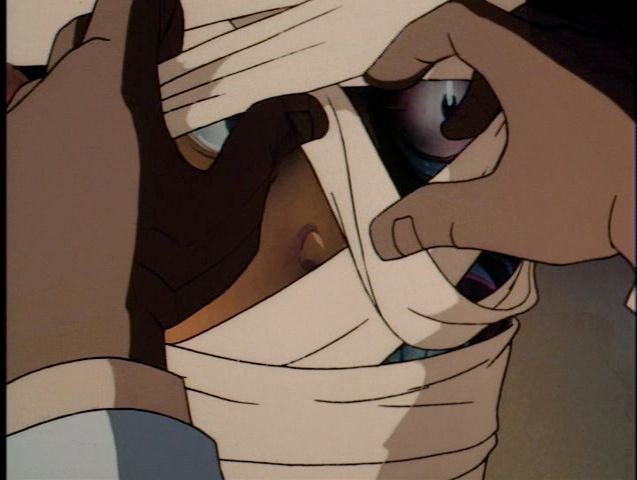
When Harvey comes out of the coma, the doctor decides that it's time to take off the bandages, and the result becomes another mirror scene to the Joker's transformation in Burton's Batman, right down to the demand to see a mirror. But there are important differences between the two scenes. Whereas Napier snatched the mirror and stared into the deeply, Harvey brought it up to his face with trembling, terrified hands. And whereas Napier's reaction is to burst out into insane Joker laughter, Harvey instead unleashes a howl so horrible that I can virtually feel Richard Moll's vocal cords tearing from the strain.
He races out into the hallway, just in time for Grace to walk up with flowers. She calls his name, and he turns to look at her. In true monster-movie fashion, the lightning strikes as Harvey turns to her and reveals himself to the audience.
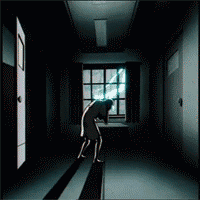
In this moment, Harvey's reaction is nothing less than pure horror. He hasn't become a complete monster here, he's no longer BBH, he's not seething with rage or plotting his revenge. He's horrified, and I think the way he looks to Grace speaks of sheer desperation and helplessness. And when she faints, his manner becomes downright mournful right before he vanishes into the stormy night.
Why does Harvey leave her, rather than stay with her and let her help him? It's never explained, but if we have to draw an assumption, maybe the fact that she fainted was "proof" to Harvey that he would now be too horrifying to love, especially now that his dark side has been exposed for all the world to see. Basically, I'm going with the Golden Age motivation, with a dash of Eye of the Beholder here, and taking into account that this Harvey was already established as the type who wouldn't accept help from others. From the way he looks at her, Harvey thinks that he's already lost Grace.
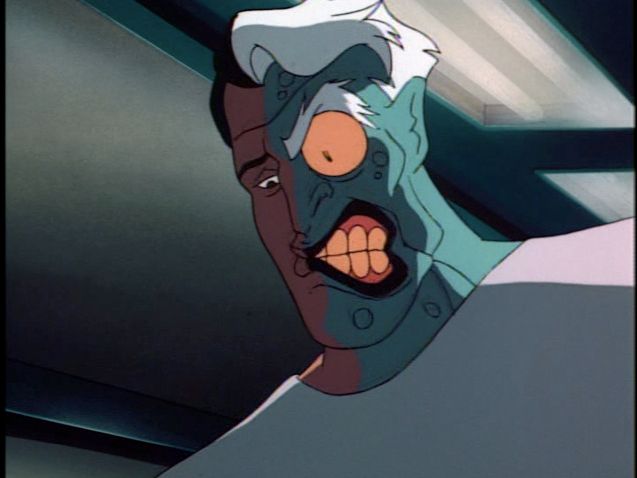
"Goodbye, Grace."
When he speaks, the voice is raspy and growling like BBH's, but mournful and quiet like Harvey's. In Dual to the Death, Gravel wrote an added scene of Dr. Crest theorizing that Two-Face is an all-new THIRD personality, one which combines aspects of both Harvey and BBH. We'll further explore that idea as we look at Two-Face Part II, an episode which doesn't really fit the Harvey we've seen established in this first part, perhaps thanks to the fact that they both have different screenwriters.
Another difference between the two versions, as you may have noticed from the screenshots, is that only Harvey's face his scarred, whereas for the rest of his DCAU appearances (including the second part of this very episode!), the whole left side of his body is scarred, warped, warty, and blue. Personally, I hate that, and I hate the precedent it set for the character. He's Two-Face, for god's sake, not Two-Body. It's a testament to the DCAU's take on the character that I'm usually able to ignore this complaint, but I hope you don't mind if I get that nitpick out of the way before we commence with part two.
For now, though, I think I've already overloaded everyone with enough pics and gifs for one post.
Note: All scans either made by me, or taken from World's Finest Online and ToonZone.com. Gifs taken from the Tumblr feeds for DCAU, BigBardaFree, GhostofCheney, and FuckYearBatmanGifs, via FYearTwoFace.
Of course, this isn't going to be a straightforward review where I discuss the highs and lows of the episode. Want the short review? Here: it's a fantastic episode, but not without its flaws, and I think the second half is a major dip in quality from the first while still ending on a powerful note. In terms of what the show was and what it set out to accomplish, Two-Face is an imperfect masterpiece, but a masterpiece nonetheless. If you haven't seen it yet, it can be watched for free at theWB.com.
But I can't just leave it at that. After all, this is me: your favorite long-winded, nit-picky Harvey Dent obsessive! No, with a Two-Face story and character this beloved, this popular, this definitive, I need to examine (read: nitpick) the hell out of every single aspect of the episode: plot, dialogue, score, design, and most of all, analysis of Harvey's character. I want to find out what makes this version of Harvey tick, what works and what doesn't, and explore the many unexplored areas of his character. Because I care, dammit.

To talk about what made this episode great is, in some ways, to talk about what made B:TAS so great in general. First off, it begins with a perfect example of one of the show's trademark staples: the title card.
Hearkening back to the openings of classic black-and-white movies, the title cards by producer/animator Eric Radomski (among others, but mainly Radomski by all accounts I've found) helped give the show a cinematic flair, and instantly set the stage for each episode. The card for Two-Face is stark and wonderfully minimal in a retro way, although I find it interesting that the shaft of light illuminates the side which will be scarred. Did Rodomski (or whoever) make the common mistake of getting the sides wrong, or did he intend to highlight the part of Harvey which would be lost? Either way, the image packs a punch, especially when combined with that straightforward, no-frills title. If that weren't enough to establish a bluntly inescapable sense of dread, Shirley Walker's chilling theme seals the deal.
The late, great Shirley Walker is another person whose contributions to B:TAS' greatness cannot be understated. She treated what could have been a Saturday morning kids' show with the same effort and skill that she'd give a full-length movie, which really went a long way to making the show seem epic, sweeping, and... well, I hesitate to use the dirty word "adult," but it's certainly the best kind of maturity. Even though she was following Danny Elfman's cues from Burton's Batman movie, her own Batman theme set a different tone for the show. Whereas Elfman's own B:TAS theme was driven, dark, brooding, and thrilling, Walker's was sweeping, hopeful, adventurous, and moving. Not gonna lie, Walker's theme occasionally gets me misty-eyed. And by "occasionally," I mean "right now, as I'm listening to it." While I like Hans Zimmer's music for Nolan's films, those "BOOM! Bum-bum BOOM! Bum-bum BOOM! BAM BAM BOOM!" themes look simplistic and, well, positively one-note compared to what Elfman and especially Walker brought to the table.
My favorite thing about Walker is that she gave each villain their own theme music, a leitmotif that would recur at various points, including when they guest-starred in other episodes. From this episode onward, Harvey would often be accompanied by his mournful sing-song theme (put on some good headphones and really give this a listen):
God, this entire score is just such a feast of excellence, adding more depth to Harvey's character than what we learn in the script or infer from Moll's vocal performance. Harvey's theme is played on recorder, giving it a sense of childhood and playgrounds, but it's contrasted by the ominous strings in the background. It seems to indicate lost innocence, but the fact that it plays for the adult Harvey Dent means that the scars of that childhood linger on.
This is one reason why I personally suspect that TAS Harvey suffered from abuse rather than the "bully" origin we get, which we'll address when it comes up.
At 0:22, the two contrasting themes are joined by a third element: a crackling, tinkling sound that evokes something downright malevolent bubbling under the surface. I associate those sounds with The X-Files, which composer Mark Snow would frequently use whenever the monsters started to show up. It also anticipates the Joker's music from The Dark Knight, which is less of a theme and more a screeching white noise of madness. It's atonal, creeping, and completely incompatible with the simple recorder theme. These two themes could obviously be taken as Harvey's two sides, with the strings being the battleground of his mind. Another way to read it would be that the two themes are BOTH the repressed side of Harvey: an angry child who never grew up, but who remained hidden, festering in the dark corners of Harvey's mind.
At 1:07, the music gives way to a new theme entirely, one that sounds almost ceremonial in its use of strings and horns. This is the music of Harvey Dent, District Attorney, the good-hearted hero, the beacon of hope, full of promise and potential. In tone, it sounds remarkably similar to Harvey's theme from The Dark Knight, but while that one only hinted at upcoming tragedy, Walker's theme is more about that hidden darkness clawing its way to the surface. As such, the D.A. theme can't be sustained for long. At 1:40, the music takes a strange turn, followed by the rumbling of the strings, which pave the way for the recorder's whistling sing-song tune, one last reminder of the nightmare. The tinkling crackles are gone, but a descending string-plucking now echoes behind the flute, like a musical echo or shadow while the strings seem to tremble.
Finally at 2:20, the themes have become integrated, with strings playing variations on the recorder tune throughout the episode. It's a subtly powerful way to show the conflicting sides of Harvey Dent without ever making him simplistically torn between two extremes. But while Walker would explore those elements to greater heights throughout the rest of the soundtrack, I've already spent several paragraphs analyzing just three minutes of music, so let's finally examine the actual episode.
In this retrospective interview with writer/producer Alan Burnett, there was apparently "no resistance whatsoever" from anyone in the making of this uncommonly dark, psychologically-heavy episode. "Our crew and Fox network wanted to push the envelope. I have always loved Two-Face. I think he’s on the very top tier of villains in comic books, even though the number of stories you can tell about him is probably limited. I always thought that it was wrong that the accident that scarred his face created his split personality. He had to have been that way before the scarring. So that was the idea I was working on. I thought it was an original idea for Two-Face, but I found out later that Andy Helfer had written a comic story with that very same notion."
By accident, Burnett came to the same idea, which was the right one. But it wasn't one that was entirely reinforced in the character's previous appearances, regardless of the writers' intentions. From what we've previously seen of the character, Harvey Dent has been depicted as calm, collected, perhaps even a bit clueless, but generally a guy without a care in the world. Even when faced with the prospect of being attacked by the Joker, Dent was determined and unflappable.
Here, the first thing we see is Harvey running, panicked, screaming: he's scared out of his mind, inside his own mind.

Harvey's nightmare is one of endless mist and darkness, an expansive prison where he can run all he wants but never hide. The dark, snarling voice which will eventually become his as Two-Face is seemingly everywhere, haunting and taunting Harvey. The persona later known as Big Bad Harv (a cutesy nickname I've always detested) responds to Harvey's terror with a sadistic cackle, something that Two-Face would never do. This is the first of several indication that BBH and Two-Face are not quite the same, which I'll come back to later.

When BBH manifests, it's easy to tell even through shadow that he's Harvey's dark mirror self. I doubt that it was ever meant to be mystery, since there's a never a reveal of "Oh my god, the monster is ME!" I'm grateful that the episode respected the audience's intelligence by not including such an obvious non-twist, which was already made clearer by Harvey's desperate cry of "I want no part of you!"
Amidst Harvey's pleas, BBH begins to flip the coin, illuminated by a shaft of light similar to the title card image. Even though On Leather Wings showed Harvey flipping the coin, it's entirely the symbol of BBH in this episode. What does the coin mean to Harvey? What's the significance of BBH using it to torment his other self? We never find out. At no point in the creation of Harvey's character, not even all the way up to this origin episode, did the B:TAS writers come up with an explanation about the coin. It's just there, first as a visual cue for Harvey in On Leather Wings, now the trademark of BBH. Whatever its significance, it's enough to make Harvey wake up screaming in a cold sweat.

After having apparently taken a power-nap on the couch in his own office, Harvey is awakened by his assistant, who informs Harvey that Gordon called. "The raid's started." Hearing these words, all sense of fear, worry, desperation, and anything else from the nightmare is gone. Harvey instantly sobers, becoming the stoic crime-fighter we've seen in The Batman Adventures comic. This is Harvey in full D.A. mode. Or persona, if you prefer.

We later discover that Harvey spearheaded this raid as part of a campaign promise to bring down mob boss Rupert Thorne. This is the very first instance we've seen of DCAU Harvey being a mob-buster like his comics counterpart, rather than being somehow involved with one of Batman's costumed criminals. Harvey drives out to join the raid already in progress, because he's badass/stupid like that, and is there alongside Jim Gordon to witness Batman taking down the criminals and saving the day. Harvey shows no reaction to the Batman's involvement, which I've always thought was a missed opportunity. What does it mean to this consummate man of the Law that his big plan was largely pulled off only thanks to a vigilante?

In a moment which echoes Billy Dee Williams' Harvey swearing to bring down boss Carl Grissom in Burton's Batman, Harvey plays to the cameras and authoritatively declares, "As I have stated in my reelection campaign, I will not rest until Gotham City has been 'de-Thorned' once and for all!" Seriously, "de-Thorned" is such a wonderfully cornball politician's promise, and this Harvey has been more depicted as a cornball politician than an actual crime-fighter. In this show, he's had more in common than Mayor Hill than Commissioner Gordon. I guess that makes the contrast even more effective when he snaps after being threatened by one Thorne's more assholish henchmen.

Threatening openly that Thorne will pay Harvey back (and geez, how powerful a mobster is Thorne that his goons can outright threaten reprisals on live TV? I guess Frankie could always play it off as "You won't be so tough when Thorne gets through with you... in court, I mean!"), Frankie the Goon kicks mud on Harvey's suit. Harvey bursts into sweats and teeth-gnashing, seeing (imaginging?) the other goons laughing at him, and he snaps. Letting out an animal snarl, Harvey rips Frankie out of the cops' hands and flings him into the mud puddle, ready to tear him apart.

"Kick mud in MY face, willya?!" Well, technically, it was your suit, not your face. But hey, anything that gets the foreshadowing across, I guess. Just as Harvey's ready to pound Frankie's face in, Gordon intervenes, bringing Harvey to his senses. Instantly, Harvey realizes what he did and what he was about to, as well as the fact that the press is still there, recording his every move. Awkward!

When Gordon asks, "What in the name of heaven did you think you were doing?" Harvey sheepishly replies, "I... I dunno. I guess he just pressed the right button." "That's one heck of a button." While we later learn that Harvey is well aware about his other personality, his reactions here seem to indicate a genuine confusion, if only out of a sense of denial to himself. Maybe the "I guess he just pressed the right button" is a lame excuse to downplay the outburst not just to Gordon, but also to himself.

The scene cuts to Rupert Thorne plotting and planning, (where he delivers one of the best lines of the episode: "All men have something to hide. The brighter the picture, the darker the negative.") but for now, let's skip ahead to just focus on Harvey. We'll take a closer look at Thorne in general in the next post. We next see a far more composed Harvey at Wayne Manor, where Bruce has thrown a fundraiser in his best friend's honor, complete with an ice sculpture of Lady Justice.

The opening image of the Lady Justice statue in close-up is a great example of all the detail crammed into this show that you might not notice without a pause button. If this were a comic, the symbolism of Justice "sweating" while her face is bisected from the poster behind her would be immediate and unmistakable. Here, you blink and you'll miss it. Frankly, I like that the show doesn't dwell on the symbolism. In comics, symbolism is too often used in place of story. Here, the plot moves ahead at a brisk-but-tight pace, while stuff like symbolism and metaphor are easter eggs, thematic details that add to the story if you catch 'em.

It's here that we're introduced to Grace Lamont, our Gilda Dent stand-in for the DCAU. Presumably, she's named so after the one comic which inexplicably changed her name to Grace, which is still the greatest take on the character to date. Unfortunately, Grace Lamont is very much in keeping with classic Gilda in that she's a complete non-character who exists only for Harvey. Heck, even Golden Age Gilda was a sculptor, which at least hinted at her having a life of her own! Here, Grace has nothing of the sort. She pops up with no explanation, no backstory, and no real personality. She's terribly bland, and like classic Gilda, she serves no purpose other than to be Harvey's moral compass. Also, even though we've never met her before, she's already Harvey's fiancee. This wouldn't be so bad if Harvey wasn't already engaged to Pamela Isley, like, last WEEK. Like I said there, it's evidence that he's a romantic idiot.
Showing their support for Harvey, Grace and Bruce talk during his speech about their concerns that Harvey seems different. Bruce's comment,"Though lately he seems awfully... intense. Is he all right, Grace?" indicates that this is the first time in their five-plus years of friendship that the great detective noticed anything was amiss with his friend. This suggests that Harvey was in control of BBH until recently, unless he was just so good at covering it up that even the world's greatest detective didn't notice.
My immediate question was what causes BBH to resurface? What triggered Harvey's suppressed anger and kicked off the nightmares? Was it the stress of going after Rupert Thorne? That would make the most sense to me, since it's classic Harvey Dent to be terminally frustrated from dealing with an untouchable mob kingpin who manipulates the system to his own ends. But no, the only explanation we get isn't mob-related at all.

Kurt Vonnegut? What the hell are YOU doing there?!
According to Grace, Harvey is just under a lot of strain from the stress of campaigning. Now, this could just be Grace making an assumption and misunderstanding what's really going on, but if it really is the campaign stress that's bringing BBH out, then this again plays to the idea that DCAU Harvey is a politician first and foremost. Either way, I have to wonder how effective he is as a D.A., or even just as a lawyer in general! We never see him in the courtroom, nor do we ever hear about his conviction rate. For all we know, he's just a pretty face with a good heart and not much else. The most we see of Harvey in action is as he's schmoozing with constituents and engaging in cringe-worthy "banter" with Grace and Bruce before a chuckling crowd.
But the cloying pleasantries serve a narrative purpose once they're undercut with bad news, delivered by Harvey's assistant, Carlos: the judge threw out the case against Thorne's men from the raid because "the warrant was incomplete." It's the classic legal trope of a lousy technicality allowing the release of clearly-guilty villains. Even putting aside his simmering anger issues, Harvey's reaction is rather understandable.

"I spent three months on that raid! The fool! He's been bought... just like all the rest!" That's more the Harvey I know, the one strained by the rampant corruption in the system. In his rage, he not only attacks Carlos, causing the statue of Justice to shatter. More symbolism! Bruce tries to bring Harvey back to earth, but he's not as effective as Gordon. Harvey snarls at his friend, calling him a "rich twit," and it's only Grace who gets through to Harvey by interposing herself between Bruce and Harvey's fists.

I find it interesting that the police commissioner and Harvey's out-of-nowhere fiancee can bring him back to earth, but not Bruce, his best friend of many years. Between that and the "rich twit" like, I have to wonder if some part of Harvey doesn't feel resentment towards Bruce's privileged background, perhaps driven by buying into the "spoiled playboy" façade.
Thanks to Grace's intervention, Harvey instantly sobers, but is once again humiliated for having blown up in front of a large crowd. Meanwhile, the whole outburst has been personally witnessed by Thorne's henchwoman, Candice, who sees potential for blackmail here.

Hmm, I'm scheming. This is my scheming face. First, I raise one eyebrow, and then...
I like Candice as a villain, and I wish that she appeared in more episodes than this and Bane, where her future afterward looked less-than-rosy. Here, she's a great femme fatale, except that she never resorts to the femme fatale's main weapon of manipulation through her sexuality. In fact, a she's smart and capable villain in her own right. While she enjoys the company of evil men like Thorne, she's not just arm candy, but is in fact the main driving factor behind Thorne's plot against Harvey. Thorne knows what he generally wants, but it's Candice who does all the legwork.
What's more, she's animated with a more-than-passing resemblance to Grace. Granted, this could be because all of the TAS women look essentially the same, but in this case, I'm certain that the resemblance is intentional to make them the good and evil women in Harvey's life (because, of course, blond hair equals good, black hair equals evil), each pulling him towards either end. Why didn't Candice ever come back to become Two-Face's moll, his mirror Grace? I mean, y'know, aside from the fact that she's about to totally ruin Harvey's life, manipulate Grace, and sour their own relationship? Feh, details! Two-Face deserves his own henchgirl! Why should Joker, Mr. Freeze, Penguin, and Calendar Girl have all the sexy help?
In private, Grace lets it slip to Bruce that Harvey's been seeing a therapist. Once again, that's another example of ways that Bruce and Harvey know so little about one another. Harvey keeps his own secrets, just as Bruce does. Why are they even friends? It has to be for more than just the mutual benefit of maintaining their mutual façades, even if Harvey's is more genuine than Bruce's.

Harvey's main reason for being secretive is fears of how it will affect his campaign. "You know how some voters feel about... shrinks." While I like how this touches upon the stigma on mental illness (a stigma which, sadly, the Batman villains tend to reinforce), its use in this story speaks to Harvey's own fears of how he'll be perceived, not to mention how it will affect his career. It's a variation on the classic meme of Harvey being vain, only with far more at stake than just his pretty-boy looks. I like it, but I wish that his ideals would be in the mix as well, considering where his story is going. As we'll later see, Two-Face defines his life by ideals, but Harvey Dent does not. That doesn't work.
For Harvey, the struggle is entirely based in keeping his darker impulses in check. So okay, let's examine the DCAU's take on Harvey's darker side. But before we continue with the episode itself, I'd like to bring in supplemental material for your consideration: the YA novelization Batman: Dual to the Death, which adapted both parts of Two-Face, plus both parts of the Batgirl origin episode, Shadow of the Bat.

Since novelizations often work from earlier versions of their scripts, you can usually spot some details here or there that weren't included in the final produced story. In this, there's a second dream sequence that confirms--SPOILER!--that the "other self" is actually Harvey himself! Whattatwist! I have no idea whether that scene was in the original script, or if writer Geary Gravel added it for extra obviousness. But some of Gravel's other contributions add a new dimension to scenes as they aired in the episode.
Which brings us to the scene at Harvey's psychiatrist, Dr. Crest, who puts Harvey under hypnosis in order to speak to his dark side, which is now revealed to be named "Big Bad Harv." The silliness of that name is undercut by the genuine creepiness of this scene. There's no music, no soundtrack other than the rainstorm outside, punctuated by thunder and lightning. Is it a horror-movie cliche? Certainly. But B:TAS has always thrived by drawing from the classic monster movies, and this scene feels like one wrapped inside a psychological thriller.

In another perfect moment of blink-and-you'll-miss-it symbolism, the lighting gives a glimpse of the monster within. It should be cheesy, but it's handled so quickly, so fleetingly, that it works. If this were a comic, or if they lingered on that shot for even a frame longer, it would have been silly. Hell, even seeing it on loop in this gif lessens the impact of that shot in context:

Sorry for the epileptic shock, folks!
Alan Burnett credited this moment with episode director Kevin Alterti. "We didn’t want to reveal Harvey’s scarred face until the end of the show, which presented the challenge of holding our audience’s attention with a villain who had no costume or special accoutrements. He was just a Suit, albeit a crazy one. Fortunately he was well acted in the animation. Also, the director, Kevin Alteiri, bless his heart, figured out a way to foreshadow the scarred face with lighting effects in a scene in a psychiatrist’s office."
With Big Bad Harv rising to the surface, Harvey's demeanor hardens and turns cold. Reaching into his pocket, he produces the coin, which he then proceeds to flip menacingly. Again, what's the deal with the coin? Why is it tied directly to Big Bad Harv?

At this point, I should mention that this show is the second time that anyone's written Harvey has having a secondary personality. Sure, it was suggested (but ultimately disproven) in A Lonely Place of Dying, and Eye of the Beholder did it first, but as we've established, episode writer Alan Burnett had never read EotB, and was coming to this idea on his own. While the idea that Harvey's other personality is a cruel bully is something we've seen in stuff like DeMatteis' Crime and Punishment and Rucka's No Man's Land, the DCAU is the first to properly do it.
Which raises the question: what the hell IS Big Bad Harv? In the show, we learn that he's the result of Harvey's guilt and shame at having once lost his temper in a fight with a bully. Harvey mistakenly thought that he put the kid in the hospital, and became so ashamed that he suppressed his anger for years, which festered and manifested (manifestered?) as Big Bad Harv. It's hardly the stuff of compelling tragedy when compared to, say, systematic childhood abuse at his father's hand. But then, as we've already established, writer Alan Burnett hadn't read Eye of the Beholder--the story which established Harvey's abusive father--when he wrote this episode.
In that same interview, Burnett explained the genesis of the bully origin: "I consulted with a child psychiatrist to come up with a kid-understandable reason why Harvey Dent developed a split personality, and was surprised to find out that it doesn’t take much to start that sickness going." I think the "kid-understandable" line is key, here, since the average child would certainly understand bullying far more than abuse. But as a child of abuse myself, I can attest that it would have been incredibly meaningful and powerful to see it represented in a show like B:TAS. I suppose that wouldn't have flown with the Fox Kids censors of the time, but at least it would eventually be worked into the DCAU comics years down the line (a story which we'll examine in due time). For now, we're stuck with the bully origin.
That said, Dual to the Death adds an interesting detail when Dr. Crest equates Big Bad Harv to being nothing more than a big angry child, something which could also apply to the Two-Face of comics such as Crime and Punishment. When combined with the language and attitudes BBH uses towards Harvey ("The guy's a wimp"), it's easy to conclude that BBH has now, in effect, become Harvey's biggest bully of them all.

While one would naturally assume that BBH is the Two-Face personality that will take over once his body is scarred, it's worth noting that BBH shares almost nothing in common with Two-Face as we know the character, save for the voice. BBH is Harvey's Mister Hyde: a cruel, vicious, sneering, smiling, ravenously animalistic monster who revels in evil. I defy you to look at the above shot and tell me that it in any way resembles Two-Face's demeanor of the DCAU.
After BBH smashes the window and is about to attack Crest. In what Alan Burnett describes as his "Hitchcock moment," she snaps her fingers and wakes Harvey up out of hypnosis. He's horrified at what he's done, and anguished as to what he can do to get better. Crest suggests that he check himself into the psychiatric ward at the hospital, but campaign-mindful Harvey blanches at the notion. Could Harvey's tragic fate have been avoided if he had put his sanity before his career? Probably not, since either way, the fact that Candice was listening in just outside the office meant that Thorne was going to make his move either way.

Still scheming!
Harvey's last moment of happiness comes, appropriately enough, on the cusp of his greatest triumphs. First off, he wins the election against his unnamed opponent (Dual to the Death has it be Janet Van Dorn, the Gotham D.A. who appears in Shadow of the Bat and, most notably, Trial), followed by telling Grace that he plans to announce their wedding date as part of his acceptance speech. Because again, romantic idiot.

Everything sours once he gets the call from Rupert Thorne, who has obtained Harvey's psychiatric file and wants to talk deal. When Harvey throws on his dark gray fedora and coat (both of which he'll still be wearing as Two-Face), Bruce and Grace both notice that something's deeply wrong, but he refuses their help. Why? Does he not want to risk either of them getting hurt at Thorne's hands? Sadly, I suspect it's far more likely that he's too prideful and too insecure to risk even letting his best friend and fiancee help. This gives Harvey a Shakespeare-level tragedy where his personal flaws hasten his own undoing.

As Batman, Bruce follows Harvey to a mysterious refinery, where he meets up with Rupert Thorne and assorted henchmen. Thorne reads Harvey's file aloud, going into the origin of BBH, and offers Harvey to keep it a secret as long as Harvey plays ball. Otherwise, the people of Gotham will soon know the man, "or men," they've elected. As Thorne gloats and the henchmen laugh, Harvey starts pouring sweat, reaching his breaking point.

But instead of exploding like before, the boiling fury suddenly seems to dissipate. The sweat dries up, and Harvey seems overcome with an unsettling, dead-eyed calmness...

... which soon turns downright sinister. Hyde is in control.

"There's just one problem."
"Oh yeah? What's that?"
"You're talkin' to the wrong Harvey."

BBH proceeds to go shithouse on Thorne's men, tearing into them with a viciousness that, again, we'd never see from Two-Face. He's hunched, feral, snarling, and ready to rip everyone apart with his bare hands.

I don't know if it's intentional, but the animation here seems to overlap, as if BBH leaves shadow outlines of Harvey's own body movements.
Whatever's about to happen with Harvey, it's clear that he won't become this monster entirely. I doubt that BBH would have made any kind of criminal mastermind, since he's too wild and out of control, but his body count may well have been higher than Two-Face's if given the chance. BBH is an inhuman force of pure malicious hatred, and Thorne would have been a dead man if Batman hadn't intervened.

Batman and Harvey proceed to battle the henchmen while Candice watches with amusement from the sidelines. Thorne makes a break for it along the catwalk between the exposed tubs of nondescript boiling chemicals, and the resemblance between this setting and Axis Chemicals from Burton's Batman is giving this entire scene a fatalistic sense of deja vu. Harvey races after Thorne on the catwalk, just as Frankie takes aim with his machine gun.

Y'know, while I always used to think that this was a less graphically horrifying scarring than having his face melted off by acid, I'm forced to reconsider that belief as I watch just the explosion part play over and over and over again in gif form.

Yikes. That actually looks way worse than being burned by acid or catching fire. Realistically, I can't help but wonder what kind of internal damage he must have suffered from the way he went flying.
Batman races over to Harvey's smoldering body and turns him over. It's Batman's reaction to what we don't see which really sells the moment, as it's one of the only times we ever see the Dark Knight look both horrified and downright anguished.

Harvey ends up in the hospital, bandaged and unconscious, with Grace and Bruce by his bedside. At the very least, the press seems certain that his D.A. days are over, but only Thorne and Batman are concerned about what Harvey may become.

When Harvey comes out of the coma, the doctor decides that it's time to take off the bandages, and the result becomes another mirror scene to the Joker's transformation in Burton's Batman, right down to the demand to see a mirror. But there are important differences between the two scenes. Whereas Napier snatched the mirror and stared into the deeply, Harvey brought it up to his face with trembling, terrified hands. And whereas Napier's reaction is to burst out into insane Joker laughter, Harvey instead unleashes a howl so horrible that I can virtually feel Richard Moll's vocal cords tearing from the strain.
He races out into the hallway, just in time for Grace to walk up with flowers. She calls his name, and he turns to look at her. In true monster-movie fashion, the lightning strikes as Harvey turns to her and reveals himself to the audience.

In this moment, Harvey's reaction is nothing less than pure horror. He hasn't become a complete monster here, he's no longer BBH, he's not seething with rage or plotting his revenge. He's horrified, and I think the way he looks to Grace speaks of sheer desperation and helplessness. And when she faints, his manner becomes downright mournful right before he vanishes into the stormy night.
Why does Harvey leave her, rather than stay with her and let her help him? It's never explained, but if we have to draw an assumption, maybe the fact that she fainted was "proof" to Harvey that he would now be too horrifying to love, especially now that his dark side has been exposed for all the world to see. Basically, I'm going with the Golden Age motivation, with a dash of Eye of the Beholder here, and taking into account that this Harvey was already established as the type who wouldn't accept help from others. From the way he looks at her, Harvey thinks that he's already lost Grace.

"Goodbye, Grace."
When he speaks, the voice is raspy and growling like BBH's, but mournful and quiet like Harvey's. In Dual to the Death, Gravel wrote an added scene of Dr. Crest theorizing that Two-Face is an all-new THIRD personality, one which combines aspects of both Harvey and BBH. We'll further explore that idea as we look at Two-Face Part II, an episode which doesn't really fit the Harvey we've seen established in this first part, perhaps thanks to the fact that they both have different screenwriters.
Another difference between the two versions, as you may have noticed from the screenshots, is that only Harvey's face his scarred, whereas for the rest of his DCAU appearances (including the second part of this very episode!), the whole left side of his body is scarred, warped, warty, and blue. Personally, I hate that, and I hate the precedent it set for the character. He's Two-Face, for god's sake, not Two-Body. It's a testament to the DCAU's take on the character that I'm usually able to ignore this complaint, but I hope you don't mind if I get that nitpick out of the way before we commence with part two.
For now, though, I think I've already overloaded everyone with enough pics and gifs for one post.
Note: All scans either made by me, or taken from World's Finest Online and ToonZone.com. Gifs taken from the Tumblr feeds for DCAU, BigBardaFree, GhostofCheney, and FuckYearBatmanGifs, via FYearTwoFace.